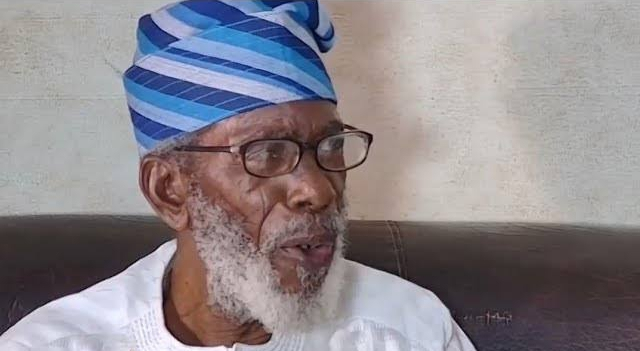Few figures in Juju music history are as memorable as Ahuja Bello, the guitarist and vocalist who carved out a space for himself during the genre’s golden era. Few figures in Juju music history are as memorable as Ahuja Bello, the guitarist and vocalist who carved out a space for himself during the genre’s golden era.
Iseyin, a small village north of Ibadan, has produced several remarkable personalities, but the most well-known are the late Sakara musician Yusuf Olatunji and the late magician Folorunsho Abiola, also known as Professor Peller. The small village has also produced Ahuja Bello, a prominent Juju musician who, while less well-known, is likely to be just as important in Nigerian cultural history. Ahuja Bello died on Monday 25th August, 2025, a day after his 83rd birthday
Who is Veteran Juju Musician Ahuja Bello?


Ismail Dele Bello was born in Iseyin on August 24, 1942. He received his primary and secondary education at mission schools in his birthplace before moving to Lagos in 1963, the same year he completed his secondary education.
Even though his father was a wealthy trader, Ismail was sent to Lagos to acquire the craft of repairing television sets. Nigeria was recently independent, and Lagos Island, where Ismail was studying, had a thriving music scene. Coming from a family of drummers and learning how to fix electronic equipment, which frequently included speakers and live music instruments, young Ismail was exposed to the music industry and attended concerts.
SEE MORE ARTICLES
Peter Rufai Biography, Early Life, Career, Cause of Death, Wife, Children, Net Worth
Muhammadu Buhari Biography: Life and Times of Former President of Nigeria
Sisi Quadri Biography: Early Life, Career, Movies, Death, Wife, Net Worth
Oba Sikiru Kayode Adetona Biography: Legacy of the Awujale of Ijebuland
Career: A Passion that Started Early
Music was more than a pastime for Bello; it was a calling. He was drawn to the guitar at a young age and mastered it through tireless work, distinguishing himself amid an era of emerging Juju talent.
While juggling his profession as a sound engineer with his hobby, he met an older man who urged him to pursue music as a vocation and took him to the EMI studio in Apapa, Lagos. When he auditioned at the EMI Studio, he was requested to form a band for recording. His debut album, named ‘Awa Ti Danfo’, was published in 1976 under the name Dele Bello. He quickly became the toast of Lagos’ elite, so he coupled his previous nickname, Ahuja, with his surname Bello, and Ahuja Bello, the Juju musician, was born.
His band was called Ahuja Bello and His Golden Eagles. Band names back then were based on dominant storylines, and there was a lot of copying amongst bands. King Sunny Ade‘s initial band was called ‘KSA and His Green Spot Band’, a direct homage to juju pioneer ‘IK Dairo and His Blue Spots Band.’
Sikiru Ayinde Barrister, a Fuji music pioneer, titled his band ‘Supreme Fuji Commanders’, and Ayinla Kollington dubbed himself ‘The General’, after their military professions and Nigeria’s dominating military rulership at the time they began attracting audiences to their music.
Ahuja Bello’s band name could have referred to S. F. Olowookere, whose band was known as ‘Commissioner S. F. Olowookere and his Federal Night Eagles Band.’ The band’s name also implies that band members had a significant role in the band’s overall activities.
Patrons were an important part of the Juju music scene back then. Nigeria was awash in petrodollars, and the burgeoning middle class increased demand for live music and other forms of entertainment. Ahuja Bello’s first live performance was for Alhaji Buhari Alade Oloto, a Lagos socialite who was popular among Lagos artists for decades. Ahuja Bello produced many albums in quick succession, worming his way into the brains of the Lagos Peppersoup elite.
However, he sounded uncannily similar to King Sunny Ade, and others accused him of mimicking Ade’s style. Some event producers allegedly used King Sunny Ade’s image to promote Ahuja Bello’s performances, leading some naive listeners to believe Ade was performing. They each had tribal marks that represented their origins, which was coincidental.
Ahuja Bello, who is four years older than Sunny Ade, has long been overshadowed by him. Ahuja, like Sunny Ade, is an equally excellent guitarist and vocalist. Ahuja appears to have taken advantage of the comparison by continuing to mimic Sunny Ade’s vocal style, including the rhoticity method, which reflects the /r/ sound in vowels when it does not exist.
The cadence, instrument, and beat styles were all identical to King Sunny Ade’s. However, he could not dance like Ade, and even if he had planned to, a car accident in 1982 that left him bedridden for several months put that dream to rest.
King Sunny Ade is one of those once-in-a-lifetime stars who has others living in their shadows, not because they aren’t talented, but because the star is too bright to be overshadowed. The relationship between Ahuja Bello and Sunny Ade is contradictory. The comparison helped him gain popularity, and despite his limited musical repertoire, he lived up to the anticipation.
Juju music lends itself to folk sayings, and in cosmopolitan Lagos, most of the street slang was/is steeped in Christian preachings. Despite Ahuja Bello’s Muslim faith, he handled this with ease. In his debut album, he sung a Christian song called ‘Ko S’oruko to dabi Jesu’, and Christian themes appear frequently in his songs.
He sang didactic songs and told many stories with folk lyrics. He used traditional Yoruba praise singing techniques reminiscent of his time as a young drummer in Iseyin. By 1977, when he celebrated his one-year anniversary, he had become so well-known that he hosted a party at Lagos City Hall to unveil the ‘Ariya Tide’ record.
The Ahuja Bello Fans Club’s matron was Alhaja Bimbola Olokodana, a well-known Lagos socialite. Professor Peller was a major enthusiast and patron. Ahuja Bello was often booked for performances by social clubs. While on tour in London in 1979, Bello recorded the live album ‘Ahuja in London’ and met Bob Marley, a reggae legend. He was then signed to Afrodisia and Ibukun Orisun Iye Records, two of Nigeria’s most well-known record labels.
Ahuja Bello’s reign came to an abrupt end while returning after a concert on his 40th birthday in 1982. He suffered an accident and broke his right femur when he collided with a halted military vehicle. This rendered him bedridden for several months. Between his journey to the EMI studio and his injury, he released ten albums.
Discography
- Oro Ayo
- Eroki Special
- Ariya Kuye
- Ewa Lobinrin.
Album
- Emi ni Ahuja
- Late Oba Abdu Ganiyu Oyewusi
- Oro Ayo
- Eroki Special.
Death
The music great died in the early hours of Monday August 25th 2025,, one day after celebrating his 83rd birthday. Bello Festus Aderemi, his daughter, confirmed his death in a Facebook post that included several images of her father.
“Rest in peace, my darling father, Alhaji Ahuja Bello. She wrote, “We love you, but God loves you more.”
His band, Ahuja Bello and His Golden Eagles, also paid tribute to him on Facebook, writing: “Though you are gone, your light continues to shine in our hearts.” “RIP, Ahuja Bello.”








